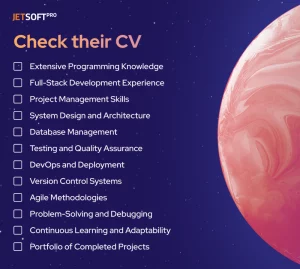Considering software development services, you always have the choice between an outsourcing company, like JetSoftPro, and in-house development. Typically, outsourcing significantly reduces development costs. You also have the option of hiring fewer people with more experience and talent or more people with average skills and lower salary expectations. Or perhaps one solo developer could handle an entire project? Let’s explore this option in this blog post.
A solo software developer is a programmer who works independently on software development without the involvement of a team. Such developers often handle all stages of software development, including:
- Requirements Analysis
- Design (don’t expect the most beautiful and user-friendly UI)
- Programming
- Testing
- Deployment
- Maintenance and Updates
Solo developers can work as freelancers, run their own businesses, or work on a contract basis for various companies. Their work requires a high level of self-organization, broad knowledge of different areas of development, and the ability to solve problems independently.
Read: How To Prioritize Software Development: 5 Methods to Help You
Famous Solo Developers and Talents for Hire
Solo developers are often associated either with indie video game development (in which case they’re often called indie developers) or with creating innovative technical solutions and small startups that stand out from everything else on the market.
Linus Torvalds single-handedly developed Linux, Bram Cohen brought the BitTorrent protocol to market, and Markus Persson forever changed the world by creating Minecraft. These legends have significantly impacted the technological landscape of our planet.
On the other hand, thousands of experienced specialists in the market do not develop their own innovative ideas but can independently handle all your product development, especially if the product is small and utilitarian, aimed at solving a single technical task.
If you’re working on such a type of tech product, a solo developer could be the perfect solution for your needs.
How to Find a Reliable Solo Developer
A solo developer capable of handling an entire project would typically have a CV that includes the following experience and skills.
1. Extensive Programming Knowledge:
– Proficiency in multiple programming languages (e.g., JavaScript, Python, Java).
– Familiarity with both front-end and back-end technologies.
2. Full-Stack Development Experience:
– Ability to build both client-side and server-side components.
– Experience with modern frameworks and libraries (e.g., React, Angular, Node.js, Django).
3. Project Management Skills:
– Experience managing the entire project lifecycle from requirements gathering to deployment.
– Ability to communicate effectively with stakeholders and clients.
4. System Design and Architecture:
– Proficiency in designing scalable and robust software architectures.
– Experience with microservices and monolithic architectures.
5. Database Management:
– Knowledge of SQL and NoSQL databases (e.g., MySQL, PostgreSQL, MongoDB).
– Experience with database design, optimization, and maintenance.
6. Testing and Quality Assurance:
– Experience with various testing methodologies (unit, integration, end-to-end).
– Familiarity with automated testing frameworks.
7. DevOps and Deployment:
– Experience with CI/CD pipelines.
– Proficiency in using containerization (Docker) and orchestration tools (Kubernetes).
– Knowledge of cloud services (AWS, Azure, Google Cloud).
8. Version Control Systems:
– Proficiency in using Git and managing code repositories.
9. Agile Methodologies:
– Experience working in agile environments (Scrum, Kanban).
– Familiarity with agile tools (Jira, Trello).
10. Problem-Solving and Debugging:
– Strong problem-solving skills.
– Ability to debug and resolve complex issues independently.
11. Continuous Learning and Adaptability:
– Commitment to staying updated with the latest technologies and industry trends.
– Ability to quickly learn and adapt to new tools and technologies.
12. Portfolio of Completed Projects:
– Demonstrated history of successfully completed projects.
– Examples of both personal and professional projects showcasing a range of skills.
These points collectively represent the skills and experience that a solo developer needs to successfully manage and execute an entire software development project independently.

Read: Will low-code programming replace the “old-school” techies?
Risks Associated with Hiring a Solo Developer
Undoubtedly, using one talented specialist instead of a whole development team seems more cost-effective, but it also comes with risks, such as:
- If this person suddenly leaves the team, it will be very challenging to maintain the development pace and preserve the project’s knowledge base. Business continuity and the bus factor are significant problem points when working with a solo developer.
- One person may not keep up with the market’s pace, and over time their expertise may become outdated.
- A single developer has too much power over the project, and often they may consider their opinion correct simply because there’s no one to argue with them. This threatens to weaken the product’s competitive potential.
- Burnout is a common professional ailment among solo developers. A drop in their work activity might coincide with a period of high workload in project development, which is also detrimental to the business.

So, Is It Worth Hiring a Solo Developer?
The rich experience and independence of a solo developer can significantly accelerate your technological product. Additionally, small teams generally work faster.
Most problems with solo developers occur during the product scaling stage. Over 20 years in the market, we at JetSoftPro have seen time and again that at the moment of scaling, even the most experienced developer’s talent must be complemented by a well-structured, clear, and meticulous process that protects the business from human risks.
If you manage to find a loyal expert inspired by your idea, hire them at the project stage where you need to quickly and competently lay the foundations.
As the project approaches the scaling stage, complement the solo developer’s expertise with a small team. Start by adding one or two additional software developers. Often, during the scaling phase, you need to rethink the design and improve code quality, so consider adding not only a developer but also a UI/UX designer and a QA.
You don’t need to expand the team with specialists of the same high-level expertise, so the new employees will be less expensive.
If you work with a solo developer, document all code changes and gather a knowledge base about the product from day one to reduce the risk of inadequate knowledge transfer.
Balance to protect the business’s interests, and let us know if you need help with software development.

